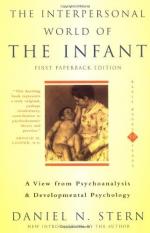
|
| Name: _________________________ | Period: ___________________ |
This quiz consists of 5 multiple choice and 5 short answer questions through Part III, Some Clinical Implications, Chapter 9, The.
Multiple Choice Questions
1. Interpersonal ________ then transitions from overt actions to the internal subjective states behind those behaviors.
(a) Action.
(b) Movement.
(c) Witnessing.
(d) Therapy.
2. Non-__________ is a situation in which the infant is unable to engage in an attunement of affect, as in the case of being around a mentally unstable person.
(a) Dysphasia.
(b) Attunement.
(c) Learning.
(d) Movement.
3. Stern describes several realms of experience without making any of them primary including all of the following except ______.
(a) Heuristic tone.
(b) Discrete categories of affect.
(c) Pleasure.
(d) Hedonic tone.
4. Core-__________ establishes physical and sensory distinctions between self and the other, according to the author's findings.
(a) Movements.
(b) Actions.
(c) Decision.
(d) Relatedness.
5. Stern believes that the capacities which tie diverse experiences of the social world together are largely determined by _________.
(a) Environment.
(b) Books.
(c) Myths.
(d) Genetics.
Short Answer Questions
1. According to the book, at around 8 weeks, infants begin to make direct _______ contact.
2. The _________ self begins to establish a theory of self and others' subjective stages on top of their own development.
3. The first sense of a self created in the first 8 weeks will remain active for _______.
4. Neurological and ethological viewpoints provide evidence that a sense of ______ is more sensitive during its formation.
5. In the first eight weeks of life, Stern believes that infants form a sense of a/an ______ self.
|
This section contains 239 words (approx. 1 page at 300 words per page) |

|




